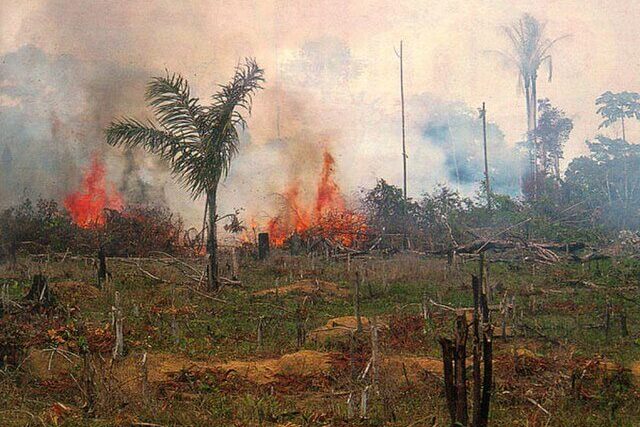
New research reveals that an area of tropical forest equivalent to the size of Switzerland was lost in 2022, indicating that the political commitment made by world leaders at COP26 to end deforestation is falling short. Approximately 11 football pitches of forest were lost every minute last year, with Brazil being a major contributor to the destruction.
The Glasgow Declaration on forests, signed by over 100 world leaders at COP26 in 2021, aimed to collectively halt and reverse forest loss and land degradation by 2030. This pledge covered countries responsible for about 85% of global forests, including Brazil, which had previously relaxed environmental laws to allow development in the Amazon rainforest. However, the new analysis by Global Forest Watch indicates that this commitment has not been fulfilled.
Loss of tropical primary (old-growth) forest is especially crucial for biodiversity and combating global warming. Rainforests in Brazil, the Democratic Republic of Congo, and Indonesia play a vital role in absorbing greenhouse gases. However, clearing or burning these forests releases stored carbon into the atmosphere, contributing to global temperature rise.
The new data from the University of Maryland reveals that primary rainforest loss in the tropics increased by 10% in 2022 compared to the previous year, with over 4 million hectares (approximately 16,000 square miles) of forest being felled or burned. This resulted in carbon dioxide emissions equivalent to India’s annual fossil fuel emissions.
“The question is, are we on track to halt deforestation by 2030? And the short answer is a simple no,” said Rod Taylor from the World Resources Institute (WRI) which runs the Global Forest Watch.
“Globally, we are far off track and trending in the wrong direction. Our analysis shows that global deforestation in 2022 was over 1 million hectares above the level needed to be on track to zero deforestation by 2030.”
Brazil dominated the losses of primary tropical forest, experiencing a 14% increase in deforestation in 2022. In Amazonas state, where more than half of Brazil’s intact forests are located, the rate of deforestation nearly doubled over the past three years.
“There’s an urgency to get a peak and decline in deforestation, even more urgent than the peak and decline in carbon emissions,” said Rod Taylor from WRI.
“Because once you lose forests, they’re just so much harder to recover. They’re kind of irrecoverable assets.”
The main drivers of deforestation are commodity agriculture, particularly soybean expansion in Bolivia, and timber logging. Ghana also witnessed a significant increase in forest losses in 2022, with some losses occurring near existing cocoa farms.
While the situation is concerning, there are positive developments that demonstrate the potential to reverse deforestation. Indonesia has achieved the most significant reduction in primary tropical forest loss among countries in recent years, attributed to government and corporate actions. Measures such as a permanent moratorium on logging in new palm oil plantations and improved fire monitoring have contributed to this progress. Malaysia has also taken action, with 83% of palm oil refining capacity operating under commitments against deforestation, peatland degradation, and exploitation.
Monitoring tree cover loss through satellite images is relatively straightforward, but accurately measuring deforestation caused by human activity is more complex. The latest figures suggest a 3.6% rise in global deforestation in 2022 compared to 2021, contradicting the goals set in Glasgow. Notably, while losses of primary tropical forests increased by nearly 10% in 2022, overall global tree cover loss from all causes actually decreased by nearly 10%, primarily due to reduced forest fires, particularly in Russia. However, researchers caution that this reduction is not indicative of a long-term trend, as fires are expected to become more prevalent due to climate change and land use changes.
Efforts to address deforestation and protect primary tropical forests are essential to combatting climate change and preserving biodiversity. Immediate action is needed to fulfill the commitments made at COP26 and prevent irreversible damage to our planet’s vital ecosystems.
——————————————————————————
At Natural World Fund, we are passionate about stopping the decline in our wildlife.
The declines in our wildlife is shocking and frightening. Without much more support, many of the animals we know and love will continue in their declines towards extinction.
When you help to restore a patch of degraded land through rewilding to forests, meadows, or wetlands, you have a massive impact on the biodiversity at a local level. You give animals a home and food that they otherwise would not have had, and it has a positive snowball effect for the food chain.
We are convinced that this is much better for the UK than growing lots of fast-growing coniferous trees, solely to remove carbon, that don’t actually help our animals to thrive.
This is why we stand for restoring nature in the UK through responsible rewilding. For us, it is the right thing to do. Let’s do what’s right for nature!
Donate today at https://naturalworldfund.com/ and join in the solution!

